Cape Coral City Council members are considering a pivotal vote on how much and when to raise fees on new construction to help pay for the basic transportation and safety infrastructure needed to support it.
The city has not raised impact fees on builders in 19 years, even as growth has surged, traffic congestion has worsened and road construction costs have climbed. Now, Council — and possibly builders, residents or both — must decide whether to cover the costs now or wait until the situation becomes more severe.
“This is a monumental decision and as council member (Joe) Kilraine said, this will establish a legacy for councils in the future to deal with,” council member Bill Steinke said. “We can either tie their hands, or we can allow further review in the future.”

Construction continues in the South Cape as the city debates how to fund infrastructure needs tied to growth.
All council members have stated that fees should go up, with the old “impact” fees replaced by a new “mobility” fee schedule. But they are faced with choosing between two routes. One may not provide enough revenue, some argue, leaving current residents on the hook. Others say a second option could raise fees too high for the building industry to absorb without sticker shock.
They plan to take up that decision at a 3 p.m. special meeting Sept. 25. Which route they take may all come down to a single vote.
One option would raise builders’ fees by 12.5% per year over four years, capped at a maximum 50% increase. Three council members have signaled support for the plan.
Five other council members say the proposal falls short, noting that studies show infrastructure costs for single-family housing far exceed the revenue it would generate. They favor the second option.
The second option mirrors the first option for the first four years, but it would give a future Council the flexibility to raise fees beyond 12.5% after that period to better keep pace with rising costs.
Either way, a future Council at the end of four years would have the option to either lower the fees or continue to increase them by 12.5%.

Road barriers and construction equipment at Cape Coral Parkway East reflect in standing water following recent rains.
Only the second option would allow Council to raise fees further in year five and beyond to keep up with growth costs that studies show will far outpace the first option.
The vote is unusual because adopting the second option, which permits increases above 12.5%, requires Council to declare “extraordinary circumstances” under state law. That means at least six of eight members must approve, rather than a simple majority. So far, only five have indicated support.
In addition, rules for invoking extraordinary circumstances require Council to make that decision before Oct. 1. After that, all eight of them would have to agree to do that.
Council member Keith Long, who first made the motion for a plan to invoke extraordinary circumstances, indicated support for option two along with Steinke, Kilraine, Derrick Donnell and Rachel Kaduk.
Mayor John Gunter and council members Laurie Lehmann and Jennifer Nelson-Lastra support option one.
Gunter at the Sept. 17 meeting said he wouldn’t change his mind. But Lehmann and Nelson-Lastra indicated that they would like city staff to crunch the numbers for the second option, further describing how revenue from that plan could help meet infrastructure needs.

Cape Coral Council member Jennifer Nelson-Lastra speaks during a Sept. 17 meeting where mobility fee increases were debated.
“It needs to be spelled out,” Nelson-Lastra said. “It’s still very ambiguous.”
If one of the three votes yes for option two, it would be put into effect.
Like the first option, the second would establish a mobility fee schedule with 12.5% annual increases over four years. However, those increases would be based on discounted rates rather than the full amount. In the fourth year, Council would have to decide whether to let the rate jump to the full amount under “extraordinary circumstances” or set a different rate at its discretion.
Council also has a third option to continue to leave impact fees where they have been for nearly two decades.
“This is definitely the hardest vote I’ve ever had,” said Kaduk said.

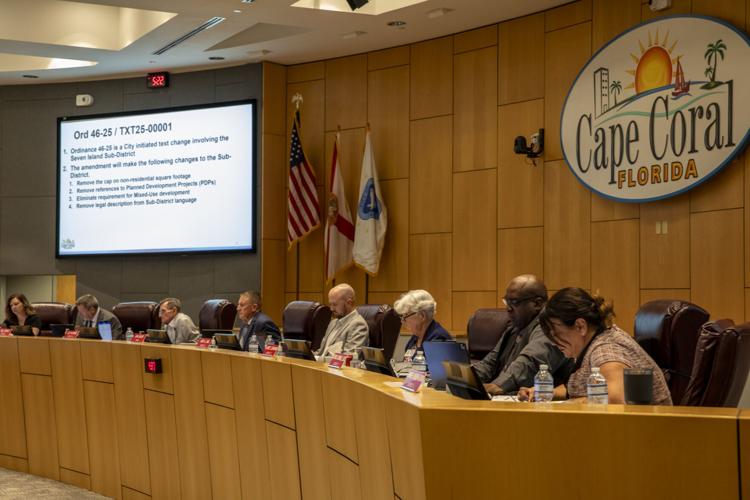
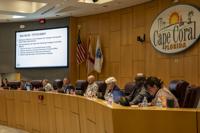

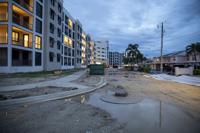



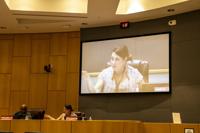
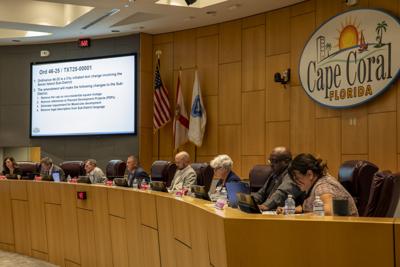
(0) comments
Welcome to the discussion.
Log In
Keep it Clean. Please avoid obscene, vulgar, lewd, racist or sexually-oriented language.
PLEASE TURN OFF YOUR CAPS LOCK.
Don't Threaten. Threats of harming another person will not be tolerated.
Be Truthful. Don't knowingly lie about anyone or anything.
Be Nice. No racism, sexism or any sort of -ism that is degrading to another person.
Be Proactive. Use the 'Report' link on each comment to let us know of abusive posts.
Share with Us. We'd love to hear eyewitness accounts, the history behind an article.